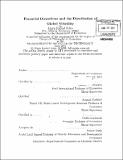Financial distortions and the distribution of global volatility
Author(s)
Eden, Maya Rachel
DownloadFull printable version (8.667Mb)
Other Contributors
Massachusetts Institute of Technology. Dept. of Economics.
Advisor
Ricardo J. Caballero, Arnaud Costinot and Guido Lorenzoni.
Terms of use
Metadata
Show full item recordAbstract
In this thesis, I study the interactions between various aspects of the financial system and macroeconomic volatility in a globally integrated environment. In Chapter 1, I illustrate that an efficient allocation of liquidity across projects mitigates the economy's responsiveness to global liquidity supply shocks. Emerging economies in which the allocation of liquidity is distorted serve as a buffer zone that insulates developed economies from shocks to global liquidity supply. This suggests that, when functioning properly, the financial system in the developed world increases its stability by facilitating the efficient allocation of liquidity. However, I illustrate that in a global environment in which funding is cheap, the financial system will endogenously deteriorate and cease to carryout this role effectively. The conclusion is twofold: first, an efficient allocation of liquidity has a stabilizing effect on macroeconomic fluctuations. Second, in a low interest rate environment, the economy cannot rely on the financial system to maintain the capacity to implement an efficient allocation. In Chapter 2, I suggest that intermediation need not be necessary in order to achieve an efficient allocation of liquidity; by setting an appropriately high tax on production or subsidy on unproductive savings, the government can manipulate the equilibrium prices of production inputs such that an efficient allocation of resources is achieved. Compared to the optimal policy benchmark, the equilibrium financial system absorbs too many productive resources. Further, the mere existence of a financial system induces unnecessary macroeconomic volatility in the form of liquidity shortages and surges in unemployment. I conclude that while the efficient allocation of liquidity is important both for the level of output and for output stability. financial intermediation is an inferior way to achieve it. In Chapter 3, I study the distributional implications of allowing for the intermediation of liquidity from developed to emerging economies. Liquidity suppliers from developed economies extract rents from supplying liquidity to constrained entrepreneurs in emerging markets. Financial integration is therefore associated with a regressive transfer of surplus from emerging to developed economies. Further, as input prices in emerging economies appreciate following the inflow of liquidity, producers in emerging economies become increasingly reliant on foreign liquidity; a sudden reluctance of foreigners to supply liquidity results in a drop in output and consumption. Financial integration therefore not only decreases equilibrium consumption in emerging economies., but also increases the volatility of consumption due to shocks to external funding.
Description
Thesis (Ph. D.)--Massachusetts Institute of Technology, Dept. of Economics, 2011. Cataloged from PDF version of thesis. Includes bibliographical references.
Date issued
2011Department
Massachusetts Institute of Technology. Department of EconomicsPublisher
Massachusetts Institute of Technology
Keywords
Economics.